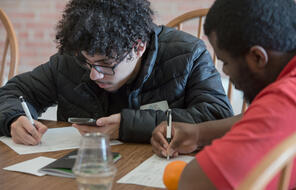“Coming into Language” by Jimmy Santiago Baca
Get it in Google Drive!
Get everything you need including content from this page
Get it in Google Drive!
Get everything you need including content from this page
In this essay, poet and social activist Jimmy Santiago Baca narrates his experience of learning to read and write while being held in prison. Starting with the books available to him, he discovered the transformational power of language and poetry. Over the course of his career, he has used poetry to raise his voice as a self-identified mestizo, someone with both Spanish and Native American heritage.
The exploration of personal and cultural identity is a common theme in American literature, a category that has traditionally been taught through the works of primarily white, male authors like the Romantic poets whose books were available to Baca during his time in jail.
In an interview with NPR, Baca explained that after studying the works of poets like Byron, Wordsworth, and Coleridge, he focused on writing about his own life’s journey in a way that authentically represented his culture and experiences: “I was searching for a voice to come out of me that had the imprint of my own culture, that had the imprint of my own people. Not Latino people but Chicano people. People de Norte Mexico.” 1 Baca became one of America’s most celebrated writers; as of 2024, he continues to write and teach writing in schools, prisons, and libraries throughout the United States.
“Coming into Language”
by Jimmy Santiago Baca
On weekend graveyard shifts at St. Joseph’s Hospital I worked the emergency room.
. . .
One night my eye was caught by a familiar-looking word on the spine of a book. The title was 450 Years of Chicano History in Pictures. On the cover were black-and-white photos: Padre Hidalgo exhorting Mexican peasants to revolt against the Spanish dictators; Anglo vigilantes hanging two Mexicans from a tree; a young Mexican woman with rifle and ammunition belts crisscrossing her breast; César Chávez and field workers marching for fair wages; Chicano railroad workers laying creosote ties; Chicanas laboring at machines in textile factories; Chicanas picketing and hoisting boycott signs.
From the time I was seven, teachers had been punishing me for not knowing my lessons by making me stick my nose in a circle chalked on the blackboard. Ashamed of not understanding and fearful of asking questions, I dropped out of school in the ninth grade. At seventeen I still didn’t know how to read, but those pictures confirmed my identity. I stole the book that night, stashing it for safety under the slop sink until I got off work. Back at my boardinghouse, I showed the book to friends. All of us were amazed; this book told us we were alive. We, too, had defended ourselves with our fists against hostile Anglos, gasping for breath in fights with the policemen who outnumbered us. The book reflected back to us our struggle in a way that made us proud.
. . .
Before I was eighteen, I was arrested on suspicion of murder after refusing to explain a deep cut on my forearm. With shocking speed I found myself handcuffed to a chain gang of inmates and bused to a holding facility to await trial. There I met men, prisoners, who read aloud to each other the works of Neruda, Paz, Sabines, Nemerov, and Hemingway. Never had I felt such freedom as in that dormitory. Listening to the words of these writers, I felt that invisible threat from without lessen—my sense of teetering on a rotting plank over swamp water where famished alligators clapped their horny snouts for my blood. While I listened to the words of the poets, the alligators slumbered powerless in their lairs. The language of poetry was the magic that could liberate me from myself, transform me into another person, transport me to places far away.
And when they closed the books, these Chicanos, and went into their own Chicano language, they made barrio life come alive for me in the fullness of its vitality. I began to learn my own language, the bilingual words and phrases explaining to me my place in the universe.
Months later I was released, as I had suspected I would be. I had been guilty of nothing but shattering the windshield of my girlfriend’s car in a fit of rage.
Two years passed. I was twenty now, and behind bars again. The federal marshals had failed to provide convincing evidence to extradite me to Arizona on a drug charge, but still I was being held. They had ninety days to prove I was guilty. The only evidence against me was that my girlfriend had been at the scene of the crime with my driver’s license in her purse. They had to come up with something else. But there was nothing else. Eventually they negotiated a deal with the actual drug dealer, who took the stand against me. When the judge hit me with a million-dollar bail, I emptied my pockets on his booking desk: twenty-six cents.
One night in my third month in the county jail, I was mopping the floor in front of the booking desk. Some detectives had kneed an old drunk and handcuffed him to the booking bars. His shrill screams raked my nerves like a hacksaw on bone, the desperate protest of his dignity against their inhumanity. But the detectives just laughed as he tried to rise and kicked him to his knees. When they went to the bathroom to pee and the desk attendant walked to the file cabinet to pull the arrest record, I shot my arm through the bars, grabbed one of the attendant’s university textbooks, and tucked it in my overalls. It was the only way I had of protesting.
It was late when I returned to my cell. Under my blanket I switched on a pen flashlight and opened the thick book at random, scanning the pages. I could hear the jailer making his rounds on the other tiers. The jangle of his keys and the sharp click of his boot heels intensified my solitude. Slowly I enunciated the words . . . p-o-n-d, ri-pple. It scared me that I had been reduced to this to find comfort. I always had thought reading a waste of time, that nothing could be gained by it. Only by action, by moving out into the world and confronting and challenging the obstacles, could one learn anything worth knowing.
Even as I tried to convince myself that I was merely curious, I became so absorbed in how the sounds created music in me and happiness, I forgot where I was. Memories began to quiver in me, glowing with a strange but familiar intimacy in which I found refuge. For a while, a deep sadness overcame me, as if I had chanced on a long-lost friend and mourned the years of separation. But soon the heartache of having missed so much of life, that had numbed me since I was a child, gave way, as if a grave illness lifted itself from me and I was cured, innocently believing in the beauty of life again. I stumblingly repeated the author’s name as I fell asleep, saying it over and over in the dark: Words-worth, Words-worth.
Before long my sister came to visit me, and I joked about taking her to a place called Xanadu and getting her a blind date with this vato named Coleridge who lived on the seacoast and was malias on morphine. When I asked her to make a trip into enemy territory to buy me a grammar book, she said she couldn’t. Bookstores intimidated her, because she, too, could neither read nor write.
Days later, with a stub pencil I whittled sharp with my teeth, I propped a notebook on my knees and wrote my first words. From that moment, a hunger for poetry possessed me.
Until then, I had felt as if I had been born into a raging ocean where I swam relentlessly, flailing my arms in hope of rescue, of reaching a shoreline I never sighted. Never solid ground beneath me, never a resting place. I had lived with only the desperate hope to stay afloat; that and nothing more.
But when at last I wrote my first words on the page, I felt an island rising beneath my feet like the back of a whale. As more and more words emerged, I could finally rest: I had a place to stand for the first time in my life. The island grew, with each page, into a continent inhabited by people I knew and mapped with the life I lived.
I wrote about it all—about people I had loved or hated, about the brutalities and ecstasies of my life. And, for the first time, the child in me who had witnessed and endured unspeakable terrors cried out not just in impotent despair, but with the power of language. Suddenly, through language, through writing, my grief and my joy could be shared with anyone who would listen. And I could do this all alone; I could do it anywhere. I was no longer a captive of demons eating away at me, no longer a victim of other people’s mockery and loathing, that had made me clench my fist white with rage and grit my teeth to silence. Words now pleaded back with the bleak lucidity of hurt. They were wrong, those others, and now I could say it.
Through language I was free. I could respond, escape, indulge; embrace or reject earth or the cosmos. I was launched on an endless journey without boundaries or rules, in which I could salvage the floating fragments of my past, or be born anew in the spontaneous ignition of understanding some heretofore concealed aspect of myself. Each word steamed with the hot lava juices of my primordial making, and I crawled out of stanzas dripping with birth-blood, reborn and freed from the chaos of my life. The child in the dark room of my heart, who had never been able to find or reach the light switch, flicked it on now; and I found in the room a stranger, myself, who had waited so many years to speak again. My words struck in me lightning crackles of elation and thunderhead storms of grief.
. . .
Writing bridged my divided life of prisoner and free man. I wrote of the emotional butchery of prisons, and my acute gratitude for poetry. Where my blind doubt and spontaneous trust in life met, I discovered empathy and compassion. The power to express myself was a welcome storm rasping at tendril roots, flooding my soul’s cracked dirt. Writing was water that cleansed the wound and fed the parched root of my heart.
1991, Reflections on Albuquerque County Jail, New Mexico and Arizona State Prison
—Florence, Arizona 2
- 1Jimmy Santiago Baca, “From Prison to Poetry,” NPR, January 3, 2014.
- Angloa white person in the US whose native language is English and whose background is of European origin.
- ChicanoChicano or Chicana is a chosen identity of some Mexican Americans in the United States. The term became widely used during the Chicano Movement of the 1960s by many Mexican Americans to express a political stance founded on pride in a shared cultural, ethnic, and community identity.
- extraditehand over or send back to the place and jurisdiction in which a crime was committed.
- vatoAuthor note: In Chicano dialect: dude. (from Jimmy Santiago Baca)
- maliasAuthor note: In Chicano dialect: strung out. (from Jimmy Santiago Baca)
- 2From Jimmy Santiago Baca, “Coming into Language,” PEN America website,
March 3, 2014.
How to Cite This Reading
Facing History & Ourselves, ““Coming into Language” by Jimmy Santiago Baca”, last updated August 8, 2024.














